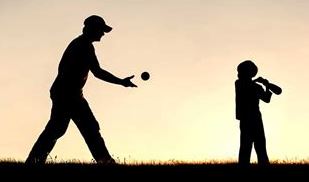Podcast: Play in new window | Download
Subscribe: RSS
About a month ago, my wife and I were on a brief vacation in Arkansas. We were fortunate enough to meet-up with a long-time friend of mine (we’ll call him K.C.). I had not seen him since we were in the eighth grade together.
During and after lunch with our lovely wives, we continued to chat about our youthful escapades playing sports together while in elementary and junior high school. His Dad was one of our youth sports coaches. In fact, his father’s coaching helped our 5th and 6th grade basketball teams win the Shreveport youth league championships!
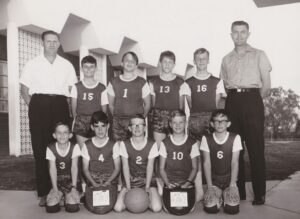
When baseball season rolled around, our primary youth baseball coach was “Mr. J”. He was the father of one of my buddies from down the street. The good news is that Mr. J had once played professional baseball as a first baseman for the Double A level Shreveport Sports!
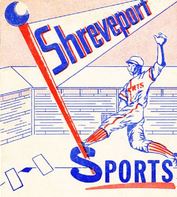
The bad news? I was the kid who was playing Mr. J’s old position (first base) on our youth league baseball team during fifth and sixth grades.
Though I tried my best, it always felt like Mr. J was paying extra-close attention to my every move at first base. I probably didn’t help matters by keeping one eye looking HIS way after bobbling a ground ball or when I might forget to “str-et-ch” my leg, arm and glove to reach an incoming ball being thrown across the infield by our excellent third baseman (K.C., of course) on a close play at first base.
Fortunately, I was moved to right field in future seasons.
After our brief reunion in Arkansas, I learned that my friend (K.C.) had written several editorials for a community newspaper over the years. After our meeting, he forwarded a terrific story he wrote years ago about youth baseball. He has given permission to publish it here.
With another season of youth baseball now upon us this spring, K.C.’s story is quite funny and still rings true. If you ever played youth baseball or have been one of the parents, grandparents, or family friends in the stands supporting the youngsters kids playing baseball, you should enjoy this. The story was called “Play Ball!”
***
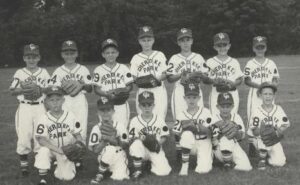
Spring! The daffodils bloom, the robins sing, and in every hamlet in America– from under the hoods of cars, and inside dusty garages, and within the invigorating spray of their morning showers–little league coaches and umpires are practicing the season’s clarion call.
“Play ball!”
Baseball, the most hopeful of games, where even with two out in the bottom of the last inning, down 8-0, the coach will shout, “OK, batter, let’s get us started!”
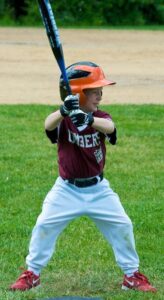
While I realize the game is occasionally marred by the actions of adults whose humanity is all too obvious, it’s a pastime like no other. There’s more community at the ballpark than in most neighborhoods in the world. Mechanics and physicians and realtors form a family that exults and agonizes together; and parents cheer for every child, knowing this could be the game—by virtue of a sharp hit or sterling catch—the child proves to the world he is a ball player.
Guidelines for parents
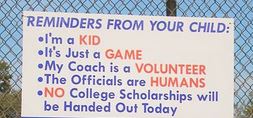
Based upon my years of experience as a little league parent, here are a few guidelines I would suggest to make this season’s experience the best possible, both for you and your child.
(1) Although your child will more than likely make it to the majors, most of the players, statistically speaking, will not. Thus, you can be a huge comfort to the other parents by helping them keep the game in perspective. “It’s just a game”, you might say occasionally, or “I know your child, the right fielder, will make a fine dentist.”
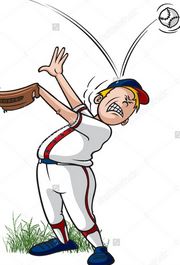
(2) You’ll notice most coaches and fans give a double dose of every nugget of encouragement, as in, “Big stick, baby, big stick”, or “Eye on the ball, buddy, eye on the ball”, and so should you. I’m not sure why this is so, but baseball is steeped in tradition, and the surest way to prove to everyone you’re a bush leaguer is to resort to the single admonition approach.

There is a subtle rhythm to baseball’s encouragement that is missing from other sports. The phrase “Kill ‘em” (football) is a real dud of an encouragement when you think about it. But in baseball, it’s, “Make it your pitch, baby, your pitch”, and “Little chatter, out there, little chatter”, and “Brang it, now, brang it!” (i.e., “bring it”—southern admonition to the pitcher to throw the ball really hard). Baseball is the only game where coaches and fans sing to their players.
(3) You’ll want to join the other parents and coaches in pelting your child with advice as he steps into the batter’s box:
“OK, now, you’re a hitter.”
“Keep that back foot planted, and step into the ball.”
“OK, take a step back, no BACK!… back TOWARDS the catcher!”
“Keep your head in there; and don’t try to kill it!”
“Come on, now, JUST RELAX!”
This barrage of advice is essential, because only by learning to ignore all this racket can your child develop the concentration necessary to become a big league hitter.
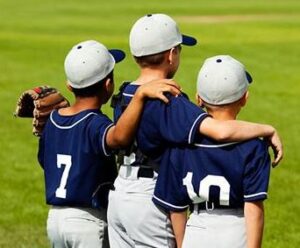
(4) When your child is walking up to the plate, always shout, “Come on now, just like in the back yard!” My father used to say this to me, and though it didn’t help me hit the ball, it gave everyone the impression that at least I had, indeed, hit it sometime.
(5) The three foot grounder hit by your child that leads to the catcher overthrowing first, who overthrows second, who overthrows third, who throws wildly home, is a HOME RUN. Buy the ball, have your child autograph it, drip some strawberry snow cone juice on it, and plop it on the trophy shelf. What your child will remember is sliding home and being mobbed by his teammates. Home run.
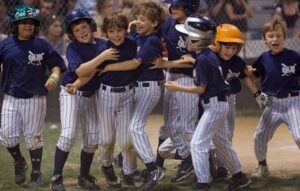
(6) Always be positive! For instance, when the last fourteen batters have walked, and your child glares discriminatingly at ball four as it sails over the backstop, you shout “Good eye, baby, good eye.”
Or when the last fourteen batters have walked, and your child strikes out on three pitches that bounce ten feet in front of the plate, you shout “Way to swing the bat, baby. We didn’t pay $50 to take a walk.”
Perspective

Sometime during the season, when the umpire makes a rotten call that costs you the game, or your child is unjustly sitting on the bench, or even when he hits a home run, you will need to keep things in perspective. Here are some thoughts that might help.
I recently made a list of my three most vivid memories of my youngest son’s youth baseball career and asked him to do the same. Here are our lists.
My memories:
(1) The time he made a diving catch of a grounder at second and threw the runner out at first to win the game;
(2) The time he caught a line drive at third and doubled the runner off at first, all captured perfectly by the local cable television camera; and
(3) The image of him rounding third to score the winning run in a playoff game.
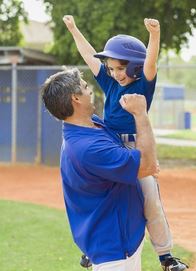
His memories:
(1) Getting snow cones after the games;
(2) Getting jerseys at the start of the season; and
(3) Getting trophies at the end of the season just for playing.
All the rest of the stuff, he says, is kind of a blur.
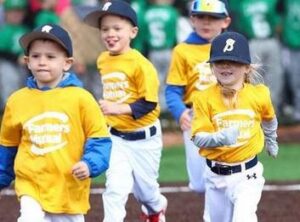
The payoff pitch
The 1998 baseball season, which featured the great home run race between Mark McGwire and Sammy Sosa, was the season that brought many of us back to the joy of the game.
In late September of that year, I took my two sons to St. Louis to see Mark (he was on a first name basis with all of us) go for the all-time season record, and he did not disappoint. In two games he magically hit home runs number 67, 68, 69, and 70.
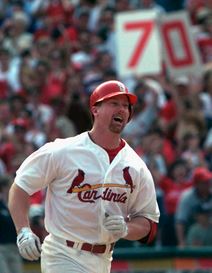
People have asked what it was like seeing him make that historic run around the bases on his 70th home run, and I tell them I don’t know.
I was too busy watching my two sons watching him run the bases. That was joy unspeakable, pure and priceless. Just like snow cones, shiny trophies, and new jerseys.
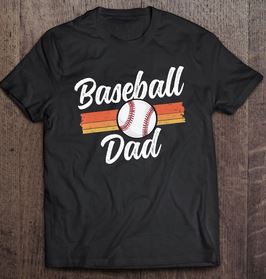
So pack ‘em to the park, baby, and let’s play ball!
***
Thanks, K.C. in Arkansas!

